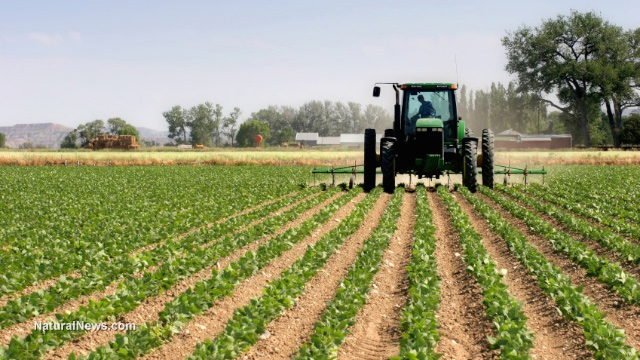Catastrophic famine could cause society to collapse within four decades, scientists say
08/11/2015 / By collapsenews

Researchers pushing the climate change/sustainability agenda have released a new report replete with dire predictions about devastating food shortages and famines in the coming years. If humans don’t change course, they say – and by humans, they’re presumably referring to multinational corporations that are raping, pillaging, and polluting our world – then masses of people might starve and society could collapse.
The report by Lloyd’s, entitled Food System Shock, is chock full of scary but typical scenarios – too many people on the planet, not enough food, and that pesky global warming that’s always looming on the horizon. Whatever the actual set of real circumstances, it’s clear that the analysis is focused on rapidly changing the way the world operates in order to avoid a major catastrophe.
Referring to food production in terms of “global supply,” the researchers involved with the report warn that future climate trends bode ominous for generating enough food for everyone to eat. They say that the food “system” is “under chronic pressure to meet an ever-rising demand, and its vulnerability to acute disruptions is compounded by factors such as climate change, water stress, ongoing globalization and heightening political instability.”
Some of this is true, of course – globalization, for example, has consolidated much of the world’s wealth and resources into the hands of just a few large corporations and other shadowy entities. These corporations typically have little or no respect for the land or environment, clawing whatever they can for the gain of their executives and shareholders at the expense of everyone else. The same is true for other short-sighted environmental abuses that are altering water availability and soil health.
Sponsored solution from the Health Ranger Store: Lab-verified Nascent Iodine solution is a dietary supplement that provides your body with supplemental iodine to help protect your thyroid during radiation exposure. Nuclear accidents such as Fukushima (or nuclear war) can expose your body to radioactive iodine-131, a dangerous radioisotope. Pre-loading your system with stable iodine occupies the iodine receptor sites on your organs, causing your body to naturally expel radioactive iodine you may have been exposed to through air, food, water or milk products. This defensive strategy is recommended by nearly all health authorities, worldwide, including the Nuclear Regulatory Commission. Discover more at this link.
The solution to food shortages and famine isn’t more GMOs; it’s decentralized polyculture
But the real problem is with large-scale monoculture, a.k.a. the industrial farming model by which many countries now cultivate large plantations of often genetically-modified (GM), chemical-drenched cash crops like corn and soybeans. This disastrous method of food production is wholly unsustainable, and any disruption stands to eliminate a significant percentage of the world’s food.
The report points out that a mere three catastrophic weather events could set off a chain reaction whereby food prices skyrocket.
Wheat, maize (corn), and soybean prices, the report claims, stand to “increase to quadruple the levels seen around 2000,” with rice prices jumping by 500 percent. The result of this would be the culmination of everything that analysts and prophets alike have forewarned us about for many years: Societal chaos and civil breakdown.
“Sudden disruptions to the supply chain could reduce the global food supply and trigger a spike in food prices, leading to substantial knock-on effects for businesses and societies,” the report warns.
“A shock to the global food supply could trigger significant claims across multiple classes of insurance, including (but not limited to) terrorism and political violence, political risk, business interruption, marine and aviation, agriculture, environmental liability, and product liability and recall.”
While not necessarily a predictive model – the researchers were careful to note that what they foresee is largely speculation of what could come to pass – the report serves as a template for how nations can respond to this potential nightmare scenario in order to prevent it from occurring. From the perspective of minimizing the risk, it would seem prudent that nations scale back their industrialization efforts and begin to diversify food production rather than centralize it. This would include ditching GMOs and biotechnology and returning to the food production methods of old.
A recent U.N. report highlights this further, noting that what the world needs is “a rapid and significant shift from conventional, monoculture-based and high-external-input-dependent industrial production towards mosaics of sustainable, regenerative production systems that also considerably improve the productivity of small-scale farmers.”
Sources:
Tagged Under:




















